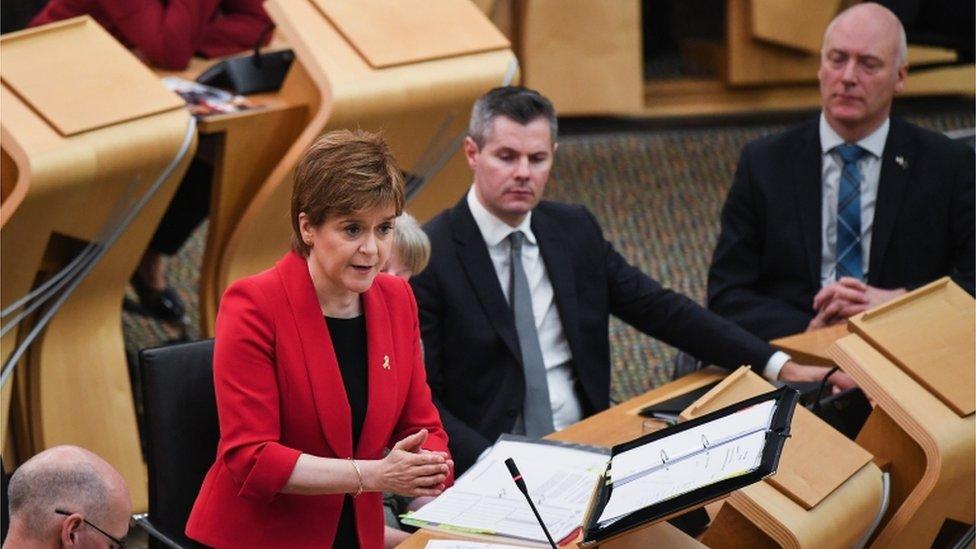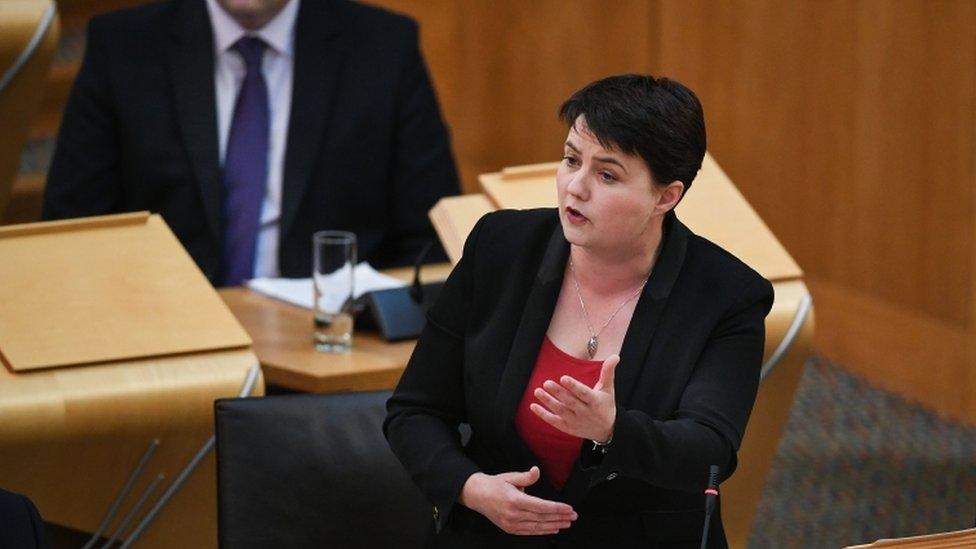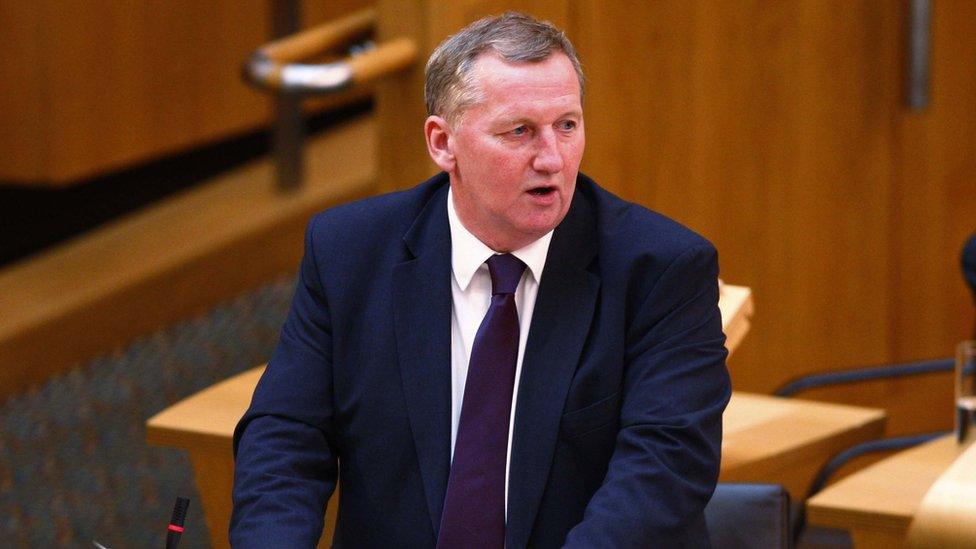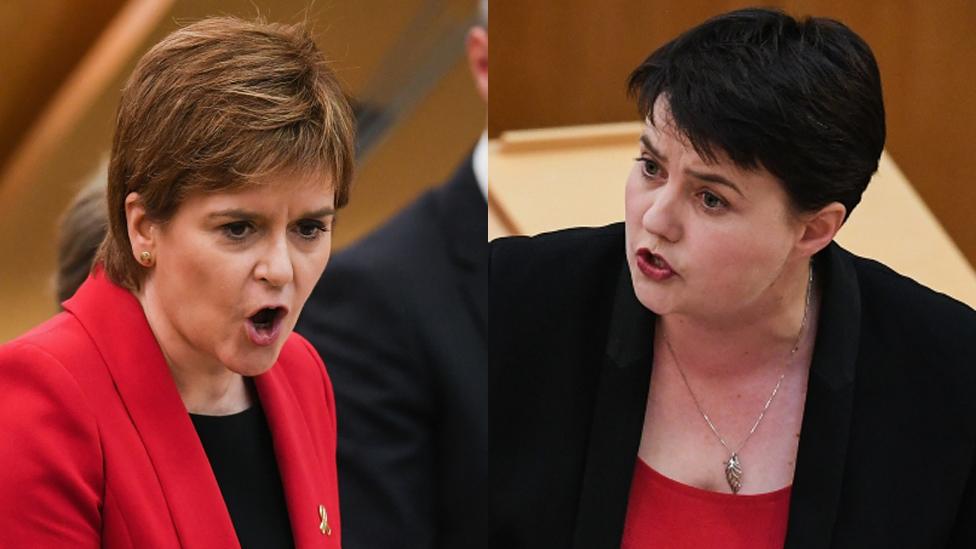Straight to the point at FMQs - but the havers continue
- Published

Nicola Sturgeon faced questions without preamble after Holyrood ditched diary questions
Funny thing, power. It's pretty easy to determine where it doesn't lie. For example, I recall now, with amazement, the importance once attached by the Scottish body politic to membership of the European Committee of the Regions.
To call it toothless would be an insult to Scotland's denture makers, those gallant artisans who fashion wallies for the gentry and plebeians alike.
It's more tricky, sometimes, to be clear about the true sources of authority. Is Theresa May in power or in office? Will Brexit bring more power but less influence, or vice versa?
And at Holyrood? Ken Macintosh, as presiding officer, tried to wield a little clout of his own by driving reforms to the procedures governing questions to the first minister.
Out went preliminary questions. No more expressing fake fascination with the FM's engagements for the day or the date of the next cabinet meeting.
No more dithering. Straight to the point. On to the main issue. Sharp, potent. The result? Questions to the first minister overran by more than five minutes and the haver count was not, discernibly, lower.
A little wearily, Mr Macintosh tried again. Shorter questions, he pleaded. Succinct answers, s'il vous plaît. Sanctions, PO, sanctions. Start with lunchtime detention.
And what about the first minister? Nicola Sturgeon wields considerable clout, extended in these reformed days by the accretion of powers over income tax.
But, of course, absolute power is not on offer in democracies. And Ms Sturgeon has a particular constraint upon her influence. The lack of a majority in the Scottish Parliament.
There is, additionally, a parallel and substantial debate under way as to whether Brexit will enhance Holyrood's powers (Source: D. Mundell) or reduce them (Source: N. Sturgeon).

Ruth Davidson pressed the first minister on her tax plans
But let us stick to taxation for now. The then relatively new Finance Secretary Derek Mackay had a battle on his hands to get his budget through last year. Deft bargaining and a deal with the Greens got him over the line.
But, even then, the Greens voiced considerable disquiet at the agreed tax proposals, making plain that they would rather have increased public spending still further, with inevitable consequences for taxation.
That, then, is the basic framework which confronts Scottish ministers as the next budget process looms. Cut a deal with Labour? Seems unlikely. A deal with the Tories? Used to work during those previous days of minority power - but the Tories are now much less keen on accommodating themselves to the SNP in any form.
Ditto the Liberal Democrats, although they negotiated seriously last time out. Privately, Willie Rennie was heard to mutter that it would need a big price tag to sign up to a party which remained committed to ending the Union.
But what if that plan for a referendum is now, effectively, on ice for a period? Does that alter the dynamic? Not immediately, I would reckon, although we shall see.
Still, whoever emerges as the potential budget chum, the issue of tax and spending will arise. Nicola Sturgeon now plans to publish a discussion paper, probably in late October just ahead of the next budget round. It will examine all aspects of the debate on tax and spending.

Alex Rowley was praised by Ms Sturgeon during his questioning
Helpfully, Ruth Davidson got the debate going. In her opening question, sans preamble, she reminded the FM, only a little obliquely, that the SNP manifesto had promised to freeze the basic rate of income tax for the lifetime of the present Parliament.
Was Ms Sturgeon still in favour of constraining tax for those in that category? A little archly, the FM noted that a debate was just that. It would not help to shut off avenues in advance.
Ms Davidson, again in helpful spirit, decided to translate. She's after your pay cheque, she declared.
Ms Sturgeon arose. Her demeanour said "hang on a cotton-picking second". The Tories, the FM asserted, were constantly demanding spending increases - then following that up with pressure for a cut in the tax bill faced by the wealthy. Some mistake, surely.
These were good exchanges, powerful and lively. But also substantive - a real debate over a real issue. The merits of public spending. The stimulus advantage of tax cuts.
For Labour, Alex Rowley spoke. They are involved in a power struggle of their own, following the departure of Kezia Dugdale. Mr Rowley is the interim boss.
His was a valuable contribution. Pausing to endorse efforts to curb what he called "Tory austerity," his main topic was mental health problems among the young.
He pursued the topic diligently, with evidence and concern but with a welcome absence of bogus indignation. Ms Sturgeon praised him as "fair".
- Published7 September 2017
